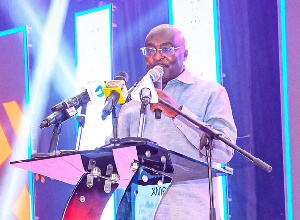Opinions of Tuesday, 19 October 2021
Columnist: Joseph Antwi
Supporting local participation in Ghana’s oil and gas industry
Local content remains one of the most highlighted aspects of Ghana’s burgeoning Oil and Gas sector. Since oil was discovered in commercial quantities within a decade of the new millennium, a case continues to be made for the strategic advancement of local participation in the sector by Ghanaians.
Almost every successive government has regarded the issue with utmost seriousness. Civil society and advocacy groups have all equivocated the essence of this approach if the industry is to continue generating dividends for Ghana’s socio-economic growth and development.
Tullow Oil is one of the most successful and effective oil and gas companies in Ghana’s history. Its presence seamlessly intertwines with the development of local capacity for participation in the sector.
The collective optimism that greeted the nascent oil sector back in 2007 mirrored the ambitions of Tullow, a company committed to growing the industry and local participation for development.
Today “local content” is not just a priority of leaders within Tullow’s organization, but a passion and commitment pursued across every facet of the company. It has become a fancy way of saying that the company and everyone within, understand and place an unvarnished commitment to Ghana and its people.
As of 2020, the company has invested about US$20 billion into the sector with direct employment opportunities to over 500 Ghanaians, some of whom have since joined other service providers and oil companies elsewhere in the industry.
Additionally, it has invested US$8.6 million in the training of Ghanaians, since 2014, with a significant number of these sponsored to undertake second degrees in oil and gas abroad.
“Local content, to me, is not just a part of our license to operate, but a differentiator in terms of our performance in Ghana. We have grown our local staff base over the last ten years and our supply chain as well. We have given about US$16 billion worth of contracts between 2010 and 2020 and US$11 billion out of that went to companies with strong local content participation,” Tullow Ghana Managing Director, Wissam Al Monthiry told the Energy Quest TV programme during a review of industry activity over the last decade.
In keeping with their commitment to developing local capacity for participation in the industry, just last week, Tullow teamed up with the Ghana Upstream Petroleum Business Academy of the Petroleum Commission (PC), to train current and future local industry suppliers on its ‘End-to-End Procurement process.
The participation proved Tullow’s image and reputation as a forerunner in the industry with over 160 suppliers taking part.
The training covered a host of processes, including total awareness of Tullow’s procurement regime, invoicing, and payment processes to suppliers. It also provided the participants with a deeper understanding of key procurement areas including, category management, vendor registration, and setup, and some procurement sourcing tools.
Addressing the participants, Vincent Yankey, Director of Finance at the Petroleum Commission, advocated for a strong commitment and effort by the group to demonstrate a deep understanding of the standards involved in the procurement of goods and services in the upstream sector, especially from the Tullow point of view.
Rudolf Essel, Indirect Procurement Category Lead for Tullow Ghana, outlined the key procurement processes required to bid properly for Tullow Supply contracts.
The programme also provided an avenue for the suppliers to provide feedback on their experience of the Tullow procurement process over the past decade.
Tullow Oil’s pledge to Ghana has never been more pronounced than it is today, and the company views its partnership with the government and people of Ghana, as crucial to the sustainable and efficient harnessing of value from the oil and gas resources sector.
Entertainment










